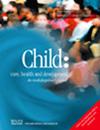The Sustainability of Self-Help Groups for Caregivers of Children With Disabilities in Kilifi, Kenya: The Changing Context of the COVID-19 Pandemic
Abstract
Background
Self-help groups offer an approach to empowering the lives of caregivers and their children with disabilities in settings of limited resources and support. A study was conducted over a 5-year period (2018–23) to assess the sustainability of 11 self-help groups in Kilifi, Kenya, during which there was the COVID-19 pandemic.
Methods
An integrated framework of action research and mixed methods was carried out over three stages. Stage 1: pre-pandemic, three self-help groups participated in focus group discussions. Template analysis structured around the five pillars of the WHO community-based rehabilitation matrix (CBR: health, education, livelihood, social, empowerment) was carried out. Stage 2: inter-pandemic, a bespoke questionnaire was administered to monitor each group. Descriptive statistics were reported (Questions 1–6) and the CBR template was applied to free-field responses (Questions 7–8). Stage 3: post-pandemic, a quality of life (QoL) questionnaire was administered to 21 caregivers of children with disabilities and a control group of 11 parents of typically developing children in the same geographical area and 8 caregivers pre- and post-pandemic. Descriptive statistics were applied.
Results
Pre-pandemic, there was food security, medicine availability, school attendance, social connections and livelihood. Group plans involved livelihood and social inclusion developments. However, member commitment, community attitudes and environmental conditions were ongoing challenges. Inter-pandemic, some socially distanced group meetings focus on COVID-19 prevention, livelihood and social support. Livelihood activities were affected variously with reported difficulties including food insecurity, school closures and reduced meeting frequency. Post-pandemic comparison between caregivers and a control group revealed overall significantly higher caregiver QoL scores. Pre- to post-pandemic evaluations demonstrated overall significantly improved caregiver QoL.
Conclusions
Despite the changing context brought by the COVID-19 pandemic, the self-help groups appear to have afforded some protection against the worst psychosocial and economic effects and helped to sustain the caregivers.


 求助内容:
求助内容: 应助结果提醒方式:
应助结果提醒方式:


